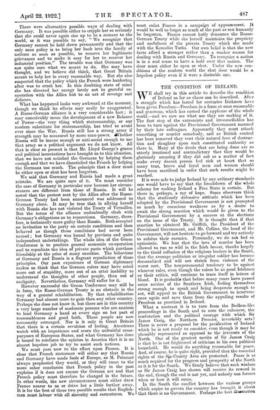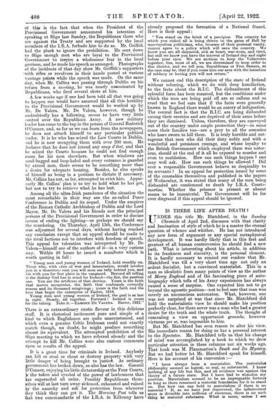THE CONDITION OF IRELAND.
WE shall try in this article to describe the condition of Ireland so far as chaos can be described. After a struggle which has lasted for centuries Irishmen have been given Freedom—Freedom in a farm at once reasonable and generous, which has earned the applause of the whole world—and we now see what use they are making of it. The first step of the extremists and irreconcilables has been to turn against the Provisional Government manned by their late colleagues. Apparently they must attack something or murder somebody, and as British control has been removed they vent their natural love of destruc- tion and slaughter upon such constituted authority as there is. Many of the deeds that are being done are so utterly irrational and contradictory that they would be gloriously amusing if they did not as a matter of fact make every decent person feel sick at heart that so many true, brave and loyal men and women should have been sacrificed in order that such results might be reached.
If it were safe to judge Ireland by any ordinary standards one would have to say that the breakdown of the whole scheme for making Ireland a Free State is certain. But there is, perhaps, a ray of hope. Some observers think that the studiously defensive attitude which has been adopted by the Provisional Government is not prompted so much by conscious weakness as by a desire to await the strong sanction which would be given to the Provisional Government by a success at the elections on the issue of the Treaty. It is thought that if that sanction be obtained Mr. Griffith, the President of the Provisional Government, and Mr. Collins, the head of the Government, will not hesitate to go forward and try actively to subdue their enemies. Personally, we do not feel so optimistic. We fear that the love of murder has been allowed to run so wild in the Irish breast, thanks largely to the timid collusion of the religious leaders in the South, that the average politician or irregular soldier has become demoralized and will not shrink from violence of the worst sort. The temperamental tendency to be against whoever rules, even though the rulers be as good Irishmen as their critics, will continue to trace itself in letters of blood. It is probable that before many years have passed some section of the Southern Irish, feeling themselves strong enough to speak and being desperate enough to act, will appeal to the British Government to intervene once again and save them from the appalling results of Freedom as practised in Ireland. What a contrast it is to turn tram the Bedlam-like proceedings in the South and to note the calmness, the moderation and the political courage with which Sir James Craig, the Northern Premier, invariably acts! There is never a proposal for the pacification of Ireland which he is not ready to consider, even though it may be plausibly represented as opposed to the interests of the North. One of the greatest merits of Sir James Craig is that he is not frightened of criticism in his own political household. He would do anything reasonable for peace. And, of course, he is quite right, provided that the essential rights of the Six-County Area are protected. Peace is as much required for the progress and prosperity of the North as it is for the South. We firmly believe that such wisdom as Sir James Craig has shown will receive its reward in the end, though the end is not yet, and nobody can foresee when or how it will come.
In the South the conflict between the various groups which aspire to govern the country has brought it about that there is no Government. Perhaps the best illustration of this is the fact that when the President of the Provisional Government announced his intention of speaking at Sligo last Sunday, the Republicans there who are against the Treaty and are supported by the local members of the I.R.A. forbade him to do so. Mr. Griffith had the pluck to ignore the prohibition. He sent down to Sligo enough men who are loyal to the Provisional Government to inspire a wholesome fear in the local garrison, and he made his speech as arranged. Photographs of the incidents of that day show Mr. Griffith's supporters with rifles or revolvers in their hands posted at various vantage points while the speech was made. On the same day, when Mr. Collins was passing through Dublin on his return from a meeting, he was nearly assassinated by Republicans, who fired several shots at him. .
A few weeks ago if one had been told all that was going to happen one would have assumed that all this hostility to the Provisional Government would be worked up by Mr. De Valera. Mr. De Valera, however, though he nndoubtedly has a following, seems to have very little control over the Republican Army. A new military leader has come to the top in the person of General Roderick O'Connor, and, so far as we can learn from the newspapers, he does not attach himself to any particular political leader. It is he who has seized the Law Courts in Dublin, and he is now occupying them with over 200 men. He declares that he does not intend any coup d'etat, and that he seized the Courts because he could not find enough room for his men elsewhere. But when windows are sand-bagged and loop-holed and every entrance is guarded by armed men, there seems to be something more than a desire for adequate housing. Besides, he also speaks of himself as being in a position to dictate if necessary. Mr. Collins has not, so far, attempted to evict him. Appar- ently Mr. Collins' plan is to try to hold what he has got, but not to try to retrieve what he has lost.
Aniong all the ultra-Irish paradoxes of the situation the most remarkable in their way are the so-called Peace Conference in Dublin and its sequel. Under the auspices of the Roman Catholic Archbishop of Dublin and the Lord Mayor, Mr. De Valera and his friends met the principal persons of the Provisional Government in order to discuss means of ending the fighting—or perhaps we should say the murdering. On Thursday, April 13th, the Conference was adjourned for several days, without having reached any conclusion except that an appeal should be made to the rival factions not to interfere with freedom of speech. This appeal for toleration was interpreted by Mr. De Valera—himself one of the authors of it—in a very curious way. Within 48 hours he issued a manifesto which is worth quoting in full :
" Young men and young women of Ireland, hold steadily on. Those who, with cries of woe and lamentation, would involve you in a disastrous rout you will soon see rally behind you, and vie with you for first place in the vanguard. Beyond all telling is the destiny God has in mind for Ireland—the fair, the peerless one. You are the artificers of that destiny. Yours is the faith that moves mountains, the faith that confounds cowardly reason and its thousand misgivings • yours is the faith and the love that begot the enterprise of Easter, 1916.
Young men and young women of Ireland, the goal is at last in sight. Steady, all together. Forward Ireland is yours for the taking. Take it.—Eetdoww DE VALERA. Easter, 1922."
There is an extraordinary exotic flavour in this delirious stuff. it is rhetorical incitement pure and simple of a kind to which Englishmen are quite unaccustomed, and which even a genuine Celtic Irishman could not exactly match though, no doubt, he might produce something almost its equivalent. The attempted prohibition of the Sligo meeting to which we have referred already and the attempt to kill Mr. Collins were also curious comments upon or results of the appeal.
It is a great time for criminals in Ireland. • Anybody can kill or steal or cheat or destroy property with very little danger 'of being brought to justict. As ordinary government has broken down, so also has the law. General O'Connor, enjoying his little dictatorship at the Four Courts, js the token and symbol of the power of lawlessness that as superseded all order. Possibly Republicans them- ;elves will at last turn away sickened, exhausted and ruined by the anarchy and ask for protection from wherever they think they can get it. The Morning Post tells us that two commandants of the I.R.A. in Kilkenny have already proposed the formation of a National Guard. Here is their appeal :
" You stand on the brink of a precipice. The country for which you risked all is being driven to the gates of Hell by unscrupulous politicians, who, because of their personal vanity, cannot agree to a policy which will save the country. Wo know you are all disgusted, sick at heart, war-worn, and tired, but still we know you have the interest of Ireland day and night before your eyes. We are anxious to, keep the Volunteers together, but, most of all, we are determined to keep order in this district, and we tell you, Republicans or Free _Staters, as the case may be, that if you come into our area with the intention of robbery or looting you will not return."
We cannot end this description of the state of Ireland without referring, which we do with deep humiliation, to the facts about the R.I.C. The disbandment of this splendid force has been resumed, but the conditions under which the men are being paid off are so callous and so cruel that we feel sure that if the facts were generally known in England there would be an outcry of indignation. The central fact is that the R.I.C. are being disbanded among their enemies and are deprived of their arms before they are dismissed. Unless, therefore, they are conveyed out of the country under ample protection they—in some cases their families too—are a prey to all the assassins who have sworn to kill them. It is truly horrible and out- rageous that men who did their duty nobly and with a wonderful and persistent courage, and whose loyalty to the British Government which employed them was notor- ious, should at the end of it all be exposed to murder and even to mutilation. How can such things happen ? one may well ask. How can such things be allowed ? Did ever a responsible Government behave so despicably to its servants ? In an appeal for protection issued by some of the constables themselves and published in the papers of Wednesday, it was stated that many of the men being disbanded are condemned to death by I.R.A. Courts- martial. Whether the prisoner is present or absent seems to be immaterial. The Government will be for ever disgraced if this appeal should be ignored.



































 Previous page
Previous page